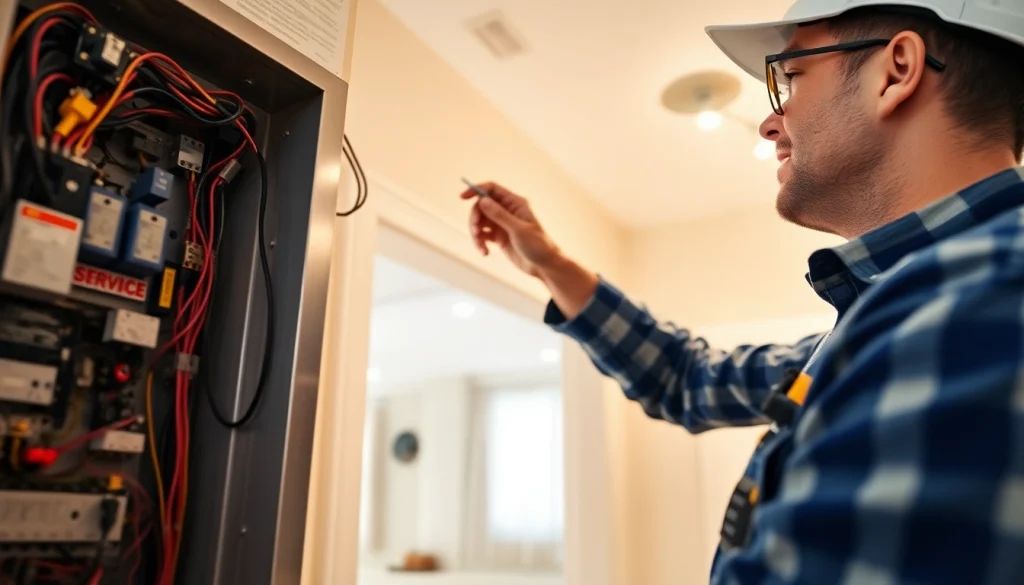Understanding Electrical Service: Key Components and Functions
What is Electrical Service?
Electrical service refers to the framework that provides electricity to homes and businesses. This system connects power from utility providers to the electrical devices and appliances we rely on daily. At its core, electrical service encompasses the wiring, circuit breakers, and distribution panels that facilitate the flow of energy throughout a building. This process ensures that electricity is delivered safely, reliably, and efficiently. For anyone looking to understand or improve their electrical setup, grasping the fundamentals of Electrical Service is crucial.
Importance of a Reliable Electrical System
A reliable electrical system is vital for providing consistent power to all electrical devices in your home or business. Fluctuations or interruptions in electrical service can lead to numerous problems, from minor annoyances like flickering lights to significant issues like complete system failures or fire hazards. Moreover, a high-quality electrical service contributes to energy efficiency, enabling homeowners and businesses to reduce their electricity bills without sacrificing comfort or safety.
Key Elements of Electrical Service Infrastructure
The primary components of an electrical service infrastructure include:
- Service Entrance: This is the point where electricity enters the building. It includes the necessary connections and protective devices.
- Distribution Panel: Also known as a breaker box, this component distributes electricity to different parts of the building and protects circuits from overloads.
- Circuit Breakers: These devices interrupt the flow of electricity when a fault is detected, preventing damage to appliances and electrical systems.
- Wiring: Properly rated and installed wiring ensures that electricity can flow safely to all parts of the building without overheating or causing fires.
- Grounding System: A grounding system directs excess electricity safely into the ground, which is critical for preventing electrical shock.
Choosing the Right Electrical Service Provider
Qualities to Look for in Electrical Service Providers
Choosing a competent electrical service provider is essential for successful installations and repairs. Key qualities to look for include:
- Licensing and Insurance: A reputable provider should have the necessary licenses and insurance to perform electrical work safely and legally.
- Experience: Look for a company with extensive experience in both residential and commercial electrical services.
- Client Testimonials: Positive reviews and testimonials from previous clients can provide insight into the reliability and quality of the service.
- Transparency in Pricing: A good provider will offer clear and detailed estimates before starting work, avoiding hidden charges and surprises.
- Warranty and Guarantees: Reliable providers often stand by their work with warranties or satisfaction guarantees, showcasing their commitment to quality.
Evaluating Providers: Certifications and Reviews
Before selecting an electrical service provider, take time to evaluate their credentials. Look for certifications from recognized industry bodies such as the National Electrical Contractors Association (NECA) or the International Brotherhood of Electrical Workers (IBEW). Additionally, checking online reviews on platforms such as Google or Yelp can give you a real-world sense of their service quality. Consider asking for references from past clients, which can provide valuable insights into their reliability and expertise.
Questions to Ask Before Hiring an Electrical Service
When interviewing potential electrical service providers, consider asking the following questions:
- What is your experience with electrical installations similar to mine?
- Can you provide a written estimate detailing the expected costs of the project?
- What safety measures do you implement during installations or repairs?
- What is your warranty policy on work done?
- Do you have references or reviews from past clients available?
Electrical Service Installation: Step-by-Step Guide
Planning Electrical Service Installation
Creating a structured plan before starting any electrical service installation is critical. This plan should encompass a comprehensive assessment of your power needs, the layout of your space, and the selection of appropriate materials. Engage a professional to conduct an electrical survey, ensuring that all factors such as load requirements and safety regulations are considered. If the project involves significant changes, obtaining the necessary permits may also be required.
Tools and Equipment Needed
Proper installation requires specific tools and equipment to ensure efficiency and safety. Some essential items include:
- Pliers: Necessary for bending, twisting, and cutting wires.
- Screwdrivers: A set of various types for securing outlets and fixtures.
- Wire Strippers: Essential for stripping insulation off wires to ensure good connections.
- Voltage Tester: Helpful in ensuring that circuits are de-energized during installation.
- Circuit Finder: Used to identify and track down circuit connections.
Safety Precautions During Installation
Safety is paramount during any electrical installation. Always follow these best practices:
- Ensure the power is turned off at the breaker panel before starting any installation.
- Use insulated tools to prevent accidental shocks.
- Follow local electrical codes and regulations closely.
- Wear appropriate personal protective equipment (PPE), including gloves and goggles.
- Keep a first aid kit readily available in case of minor accidents.
Common Electrical Service Issues and Solutions
Identifying Electrical Service Problems
Households and businesses may encounter several common electrical service issues, including:
- Flickering Lights: Often caused by poor connections, which can result in intermittent power supply problems.
- Tripped Circuit Breakers: This can signal that an appliance is drawing too much power or a fault has occurred.
- Dead Outlets: Commonly indicate a wiring issue or a problem with the circuit itself.
- Burning Smells: This is an alarming symptom that often requires immediate attention, indicating overheating wiring or circuits.
DIY Fixes vs. Professional Electrical Service
While some minor electrical issues may be resolved through DIY methods, such as replacing a blown fuse or resetting a tripped circuit breaker, others require the expertise of a licensed electrician. Attempting complex repairs without proper training can lead to safety hazards, including electrical shocks or fires. It is always advisable to err on the side of caution and consult a professional for any significant electrical work or when safety cannot be guaranteed.
When to Call an Expert for Electrical Service
Knowing when to call a professional is key to maintaining a safe electrical environment. If you experience any of the following, it may be time to reach out to an expert:
- Multiple tripped circuit breakers within a short period.
- Frequent outages affecting several devices or areas of your property.
- Unexplained spikes in electrical bills.
- Signs of smoke or burning around outlets or appliances.
- Renovations involving electrical installations that exceed your DIY skills.
Future of Electrical Service: Innovations and Trends
Smart Home Integration in Electrical Service
The future of electrical service lies in integrating smart technologies that enhance convenience, efficiency, and energy savings. Smart home systems allow homeowners to control lighting, heating, cooling, and security remotely through applications or voice commands. These technologies not only improve user experience but also help in monitoring energy consumption and identifying inefficiencies.
Energy Efficiency and Electrical Service
As energy costs continue to rise, the demand for energy-efficient electrical systems is more pronounced. Homeowners are increasingly seeking solutions that minimize energy usage while maximizing performance. Implementing energy-efficient lighting, wiring techniques, and smart appliances can lead to substantial savings over time and support sustainable practices.
Upcoming Technologies Impacting Electrical Service
The electrical service industry is on the cusp of several technological advancements that promise to revolutionize service quality. Innovations such as solar energy integration, energy storage systems (like home batteries), and advanced metering infrastructure are gaining traction. These technologies not only enhance sustainability but also empower consumers to take charge of their energy consumption with real-time data and insights.





